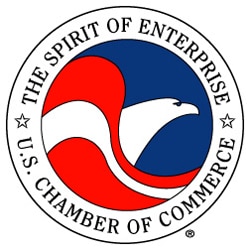The wheels are falling off the US Chamber of Commerce’s long-standing opposition to meaningful American climate policy. Why? Because their own members are demanding this Capitol Hill powerhouse move into the 21st century.
Household names as Nike and Johnson & Johnson are apparently embarrassed by the dinosaur attitude of the nation’s largest commercial lobby group.
Johnson & Johnson sent a letter demanding that the Chamber to refrain from making comments on climate change unless they “reflect the full range of views, especially those of Chamber members advocating for congressional action.”
Nike has also been “vocal” with the Chamber’s leaders “about wanting them to take a more progressive stance on the issue of climate change.”
The response from the Chamber to these corporate heavyweights? Send a memo.
William Kovacs, the Chamber’s vice president for the environment has taken the bureaucratic low road, insisting that members are happy with the Chamber’s stone age climate policy and that “so far, no companies have filed a motion that they want the chamber to revisit it.”
In case prominent and progressive companies like Levi Strauss, Starbucks, Sun Microsystems, Timberland, eBay, Gap Inc., Seventh Generation and Symantec didn’t get the obvious brush off from Kovacs, he had this helpful advice for them:
Companies were told “in order to change the group’s policy, committee members would need to file a motion and wait 30 days for members to review the policy before voting on it.”
This officious doublespeak comes from the primary promoter of private enterprise efficiency that has devoted itself to deriding government paperwork and procedure.
Kovacs went on to claim “at the end of the debate, there were no members asking to change our policy.”
A senior executive with PNM Resources was not amused with this recounting of events. “In my opinion it is inaccurate to call it a debate, and it is especially inaccurate to say that there was no call for changes to the policy when there were a number of members who stated the chamber policy did not represent their corporate position and they were therefore interested in how to change that policy.”
Ouch.
The days of the Chamber being able to hammer the Hill on climate policy with a united front have clearly come and gone. Check out this notorious video they broadcast in opposition to draft climate legislation back in 2007.
It was this kind of political lifting power that struck fear in the hearts of many a legislator, making the US a leading resistor to moving the world towards a greener economy.
The Chamber has long been the one of most powerful and united political voices resisting a greener world. Not any more. Chamber chapters across the nation are assisting in demolishing this house of cards by hosting their own progressive climate policy events.
Here is a bold prediction: The Chamber may soon have a new climate policy, and Mr. Kovacs may soon be looking for a new job.
Subscribe to our newsletter
Stay up to date with DeSmog news and alerts






